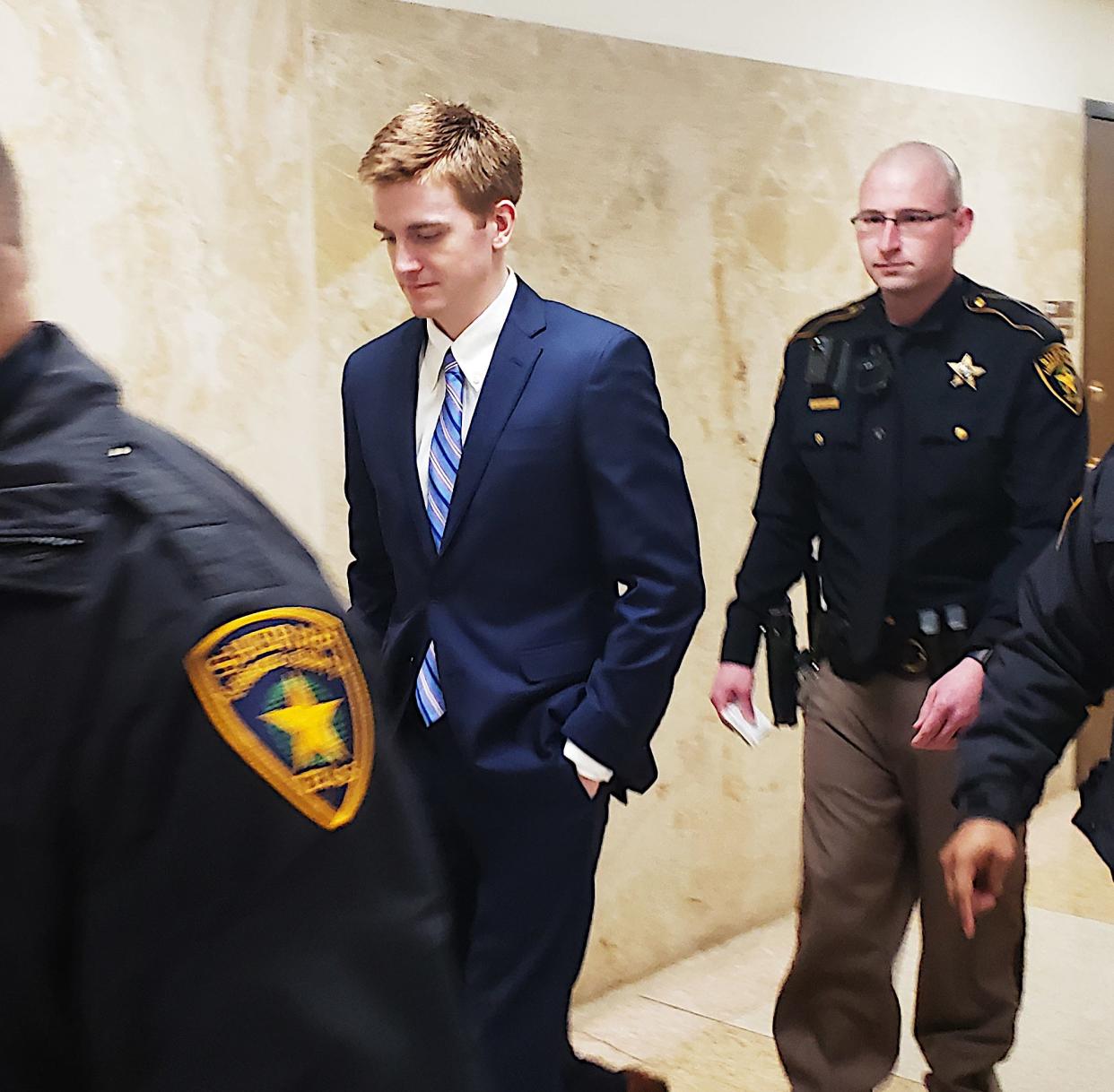Parents recall Hollis Daniels' struggles with depression before deadly shooting of Tech police officer

Years after watching the video of a Texas Tech police officer's deadly shooting five years ago, Dan Daniels still struggles to reconcile the fact that the gunman who threw his family into a nightmare was the was the same person he raised in the small town of Seguin.
He told jurors on the ninth day of testimony at his son's capital murder trial in the 137th District Court that he didn't realize his son's drug problem and depression were so bad that it devolved into a mental health crisis that ended with him stealing a .45 pistol and smuggling it into the Texas Tech Police Department where he would execute Officer Floyd East Jr., who arrested him for a drug offense.
"I'm not able to comprehend what I saw, but it was just an unbelievable, horrific nightmare," Daniels said as he fought back tears. "It could not have been the person I raised. It just could not have been."

Hollis Daniels III, known by family and friends as Reid, pleaded guilty to capital murder of a police officer. A jury will decide at the end of the the trial whether he will be sentenced to life in prison without parole, or to death.
Prosecutors rested their case on Feb. 13 and Daniels' defense team, led by Houston attorney Chip Lewis, called on their client's friends and family members in an effort to present mitigating evidence that would spare Daniels a death sentence.
Extended family members recounted to jurors the family's dismissive attitude towards mental health struggles. Jurors also heard from witnesses who told them that Daniels has spent the last five years in custody at the Lubbock County Detention Center, strengthening his faith and helping others find hope though religion.
Janis Daniels told jurors that her son struggled with self-esteem issues since at least 8th grade. She told jurors her son would often engage in self-loathing behavior that doctors initially believed stemmed from a blood-sugar imbalance.
However, she said she didn't try to find any mental health counseling for her son.
"I regret that, not taking him to counseling," she said.
Janis said she and her husband weren't raised in a family that believed in the benefits of counseling.
"We didn't take our kids to therapy," she said. "We kind of thought loving them and being close to them was the way to be helpful."
Dan Daniels' cousin, Joan Arnold, told jurors about the Daniels family's history with substance abuse and mental health.
She listed multiple members of the Daniels family who either died from alcoholism or suicide from depression.
She said the family hid those struggles and sought help. It's an attitude the family holds to this day.
"It was considered a weakness (to acknowledge and treat mental health struggles)," she said.
Amy Turk, Janis' distant cousin, told jurors that the maternal side of Daniels' family also had the same attitudes on mental health.
Signs of their son's drug use surfaced in his sophomore year of high school when he was arrested for possessing synthetic marijuana.
Daniels was placed in Guadalupe County's juvenile drug court program, which he successfully completed.
However, Janis said her son appeared burdened by the shame and disappointment his actions brought on the family. And yet, she said her son continued to smoke pot.
Robin Vaughan Dwyer, the former Guadalupe count-court-at-law judge who presided over Daniels juvenile drug case, said he's know the Daniels' family for years and had seen the defendant grow up.
He said after Daniels' arrest, he was accepted into the county's juvenile drug court program and successfully completed it.
"He did everything that he was asked to do," he said.
However, he told jurors he believed Daniels' parents didn't take their son's drug issues seriously enough.
"They were trying to get past it," he said. "I believe it required more intervention at that time."
Daniels family members shared jurors their observation that Dan Daniels, who operated the family theater downtown, was often left as the sole caregiver for his two children, as Janis, a travel writer, was often out of town for work.
Daniels' parents told jurors that they spoke to their son many times about his marijuana use but didn't realize that he'd started abusing Xanax as well.
"We told Reid," Dan Daniels told jurors. "We had serious talks, 'You do not go into your life doing anything like this for goodness sakes.'"
Meanwhile, they said their son, who enjoyed music and water skiing, sank further into depression, unable to find joy in anything or hope for the future.
Janis said she and her husband made efforts to encourage their son to attend college and ultimately they persuaded him to attend Texas Tech University through the school's transfer acceleration program, which admits students on a probationary status.
Dan Daniels told jurors their son's first semester at Tech was rough. At some point, he was arrested for possession of marijuana, but was accepted into a pretrial diversion program, which he completed.
Daniels said that when his son returned home for winter break it was clear he was unhappy.
"He wasn't engaged with us," he said. "He looked bedraggled, skinny, no energy, his face was kind of sunken. It didn't look healthy."
Though Daniels' friends in college told jurors they were concerned about his increasing Xanax use, Dan Daniels still believed his son was only using marijuana.
"Looking back on it I should have (suspected he was using harder drugs)," he said.
However, Dan told jurors he saw a sliver of hope when his son was able to bring up his grades to a 3.0 at the end of his freshman year.
"I remember thinking we're doing something right," he said.
In the summer before his son's sophomore year a tragedy in their family sunk Reid further into depression. A family friend, 78-year-old A.C. Cunningham, died after spending months in a coma from being struck in a hit-and-run crash.
Cunningham had worked for the Daniels for years and was considered a member of the family. Janis and Dan told jurors their son was especially close to Cunningham, who became a grandfather-like figure to the boy.
Janis remembers watching her son bawling as he draped his body over Cunningham, who lay in hospice care.
"He was devastated," she said.
Janis recalled to jurors a conversation she had with her son in July of that year, around the time of his birthday and a month after Cunningham's death.
She said Reid appeared depressed and agitated as he made self-loathing comments.
"At one point he said, 'I've been looking for a gun to kill myself," Janis said. "His father and I were shocked and upset."
She said it was at that point she sought professional help and found a doctor who prescribed her son anti-depressants after which appeared to improved.
She said her son returned to Texas Tech and appeared to be doing well when they visited for parents week. She said her son proudly showed them his dorm room, which appeared neat and clean.
"He seemed good," she said. "Like he was on a good track. I actually said to our daughter we felt so good about it that weekend, 'I can see Reid graduating from Texas Tech."
Dan Daniels told jurors his son began looking forward to a future in radio.
"Good knows we never expected anything like this," he said.
Janis Daniels told jurors the day of the shooting, she was flying back from a wedding and saw one of her son's friends, Madison Davenport, contacted her on social media that morning. She finally heard back from Davenport when she landed in Austin where her husband was waiting to drive her home. They were nearing the city limits when she learned that her son stole a gun the night before and talked about killing himself.
Janis said her thoughts took her back to the conversation she had with her son in July and she told her husband to turn back to airport so she could find a flight to Lubbock to save her son.
As she was boarding her flight, Janis called Tech's crisis hotline, asking for someone to send police to check on her son. At the same time, news of a shooting on campus was spreading but she didn't believe it had anything to do with her son.
It wasn't until her flight was laid over in Dallas that she learned the news from a friend.
"I was trying to avoid the televisions at the airport," she said.
But the news was inescapable by then.
"I made flight to Lubbock and everyone on the plane was talking about it," she said. "I was in shock."
Janis had also seen the video of the shooting and also does not recognize the person who killed the officer as her son.
"He seemed soulless and hollow," she said. "His eyes were like little black dots. It wasn't my son," she said.
Janis' mother, Carolyn Turk, told jurors that her grandson was remorseful and sorrowful. She said she regularly speaks with her grandson and the two often have deep discussions about Christianity.
"Reid has had a very real encounter with the living God," she said. "This is the real thing with this kid."
She said she believes her grandson can make a positive contribution to a prison society.
"I've never seen such depth of growth deep roots in one so fast," she said. "The Gospel had set him free," she said. "He's a new creature. There is true forgiveness of sin. And he can share that with his fellow men and set them free."
Dr. Steven Beebe, a professor emeritus at Texas State University told jurors that he has frequent discussions about Christianity with Daniels, who he said has expressed a desire to help people.
The trial resumes today with Janis Daniels returning to the stand for cross examination.
This article originally appeared on Lubbock Avalanche-Journal: Parents family testify Hollis Daniels Texas Tech capital murder trial

